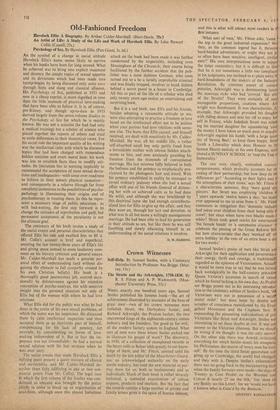Crown Witnesses
WHEN, exactly one hundred years ago, Samuel Smiles published his famous book—`the art of achievement illustrated by accounts of the lives of great men'—two of his crown witnesses were Jedediah Strutt, the Derbyshire hosier, and, Richard Arkwright, the Preston barber, the two uncrowned kings of the eighteenth-century cotton industry and the founders, 'for good or for evil,' of the modern factory system in England. What sort of men were these whom Smiles picked out to illustrate his gospel of work? The discovery, in 1950, of a collection of unexplored records in the Strutt mills at Belper adds greatly to our know- ledge of them; and Mr. Fitton, assisted until his death by the late editor of the Manchester Guard- ian, an acknowledged authority on the early textile industry, has used the new material to por- tray them for us, both as businessmen and as 'individuals. Much of their book is rather severely technical, a statistical examination of cotton imports, products and markets. But the fact that the records contain a large number of private and family letters gives it the spice of human interest,'
and this is what will attract most readers in first instance.
'What sort of men,' Mr. Fitton asks, 'came the top in the great industrial expansion? W• they, as the common legend has it, thrustin hard-headed adventurers, or might they not j as often have been sensitive, intelligent, civilis men?' His own interpretations seem to suppo the latter contention; but it is difficult to thi that he is not sometimes a little too complace in his judgments, too inclined to explain away t hard-headedness of the makers of the Industri Revolution. By common assent of come poraries, Arkwright was a domineering tyran the nouveau riche who had 'arrived.' But wh of the Strutts? They were certainly of mo manageable proportions, cautious where Ar wright was flamboyant. It was characteristic, f example, that Arkwright provided his daught with riding dresses and sent her off to enjoy he' self in France, while Jedediah Strutt was rebu ing his married daughter for squandering `awa the money I have taken so much pain to acquire Arkwright regaled his hands 'with a large qua tity of Strong Beer,' to keep them happy. Strut '(with a Liberality which does Honour to th human Heart) entirely at his own Expense, inst tituted a SUNDAY SCHOOL' to 'stop the Tide Immorality.'
The two men, clearly, embodied contra) temperaments, which probably accounts for Eh' ending of their partnership; but how deep do tht differences go? 'According to their lights and it the atmosphere of their times,' says Mr. Fitton is a characteristic sentence, they 'were good era, ployers.' But Strutt was employing 'children of 7 years upwards' twelve hours a day; `no injury ever appeared to me to arise from it.' Mr. Fitton comments in mitigation that 'domestic industr had taken over children from their being able t crawl'; but since when have two blacks made 0 white? Strutt took good marks for entertaining 'the female hands' to 'a sumptuous dejeuner' to celebrate the passing of the Great Reform Bill; but how characteristic that they 'worked off' the extra holiday 'at the rate of an extra hour a dal for two weeks.'
Samuel Smiles's praise of men like Strutt an Arkwright for their application and perseverance, their energy, thrift and courage, is traditional regarded as the epitome of Victorianism. Actually it would be more true to say that he was turning back nostalgically to the half-century preceding Queen Victoria's accession in search of virtues which he found lacking in his own day, As Profes• sor Briggs points out in his interesting introdue- Lion to the centenary edition of Smiles's book, 'the Victorians were not in possession of a secuti moral orde,' but Were beset by doubts and scruples of conscience reawakened by the Evan' gelical Movement and the Clapham Sect. 10 expounding the pioneering individualism of prey Victorians like Strutt and Arkwright, Smiles was attempting to set these doubts at rest. It was one answer to the Victorian dilemma. But we should be wrong if we thought it was the only answer. On the other side there was Arnold, criticisin$ everything for which Smiles stood, his smugness, his Philistinism,•the maxim of 'every man for him- self.' By the time the third Strutt generation was going up to Cambridge, the world had changed, and they with it. Despite Smiles's exhortations there was no going back to the buccaneering days when the family fortunes were made—the days of 'Twenty• p. Cent Profitt on the. Worsted and Cotton & nearly 27 on the Silk,' but 'dont lel any Boddy see this Letter,' for we 'would not have it known what is Gain'd by the Business.'
GEOFFREY BARRACLOUCi0






































 Previous page
Previous page